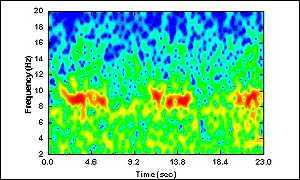Scientists have developed a sensor that can record brainwaves without the need for electrodes to be inserted into the brain or even placed on the scalp.

|
| Brain activity as the eyes are opened and closed. |
They believe the new sensor will lead to major advances in the collection and display of electrical information from the brain - and could even be used to control machines in a more effective way than is currently possible.
It is a new age as far as sensing the electrical
dynamics of the body is concerned |
| Professor Terry Clark |
Conventional electroencephalograms (EEGs) are collected either by inserting needle electrodes directly into the brain or by fixing electrodes to the scalp.
This process often leads to trauma, so that it may be necessary to remove some of the patient's hair.
In addition, the process of attaching conventional electrodes may lead to skin abrasion and irritation.
Now a team from the Centre for Physical Electronics at the University of Sussex has developed a far more user-friendly technique.
From a distance
Instead of measuring electric current flow through a fixed-on electrode, the new method takes advantage of the latest developments in sensor technology to measure electric fields from the brain without actually having to make direct contact with the head.
We deal with patients who have Alzheimer's disease and schizophrenia who often have delusions about electrodes in their head |
| Professor Tonmoy Sharma |
Lead researcher Professor Terry Clark said current imaging techniques were very good at providing information about fixed anatomical structures in the body.
But it had proved more difficult to find ways to monitor the body's ever-changing electrical currents - the information that was needed to gain a real insight into the electrical workings of the body.
He said the new system provided a way to do this effectively, and because it was non-invasive it was completely safe, and more accurate because it did not interfere with the electrical fields generated by the body.
Professor Clark said: "It is a new age as far as sensing the electrical dynamics of the body is concerned, like seeing in colour for the first time.
Many possibilities
"The possibilities for the future are boundless.
"The advantages offered by these sensors compared with the currently used contact electrodes may act to stimulate new developments in multichannel EEG monitoring and in real-time electrical imaging of the brain.
"By picking up brain signals non-invasively, we could find ourselves controlling machinery with our thoughts alone: a marriage of mind and machine."
The same group of scientists has already made remote-sensing ECG units which can detect heartbeats with no connections at all.
Professor Tonmoy Sharma, a neuropsychologist at the Clinical Neuroscience Research Centre at Dartford, Kent, said a device to measure electrical activity in the brain without the need for electrodes would potentially be very useful.
"We deal with patients who have Alzheimer's disease and schizophrenia who often have delusions about electrodes in their head, and who refuse treatment.
"A non-invasive method would allow us to monitor the effects of drugs on the brain over time, and to tailor treatments more effectively."
10 Jun 02 | Health
Scan predicts path of depression
05 Feb 01 | Health
Brain scans spot 'happy thoughts'
06 Sep 02 | Health
Baby brainwaves measured in womb
Internet links:
Physical Electronics and Instrumentation Group
University of Sussex
Image generated by Dr Harland's brain
Top Health stories now:
Brain damage link to sleep disorder
Child passive smoke damage spotted
Huge cost of Aids to Uganda
Personal trainers under the spotlight
Doctors treat 'rabies' victim
Caffeine 'does not raise blood pressure'
HIV patients forget to take drugs
Twins provide breast cancer clues